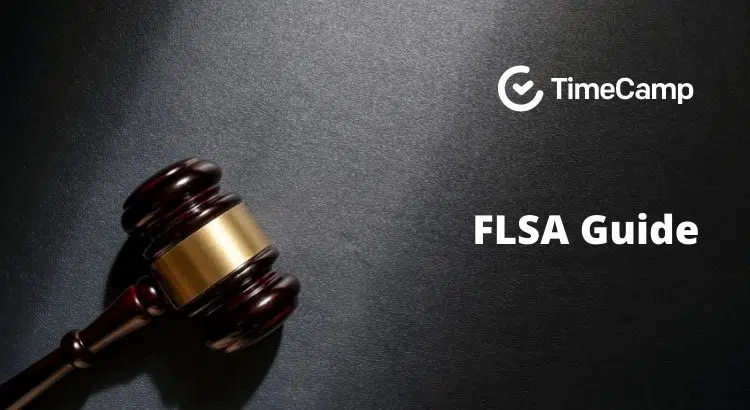The Ultimate Guide About The FLSA, its Purpose & Why You Should Care
-
Lorea Lastiri
- December 6, 2021
- 10 min read

The Fair Labor Standards Act (FLSA) is a law that sets paying overtime laws, minimum wages, and child labor standards. FLSA also classifies employees into exempt or nonexempt. Nonexempt employees are eligible for overtime of one-half times the average hourly rate for hours over 40 hours in a week.
FLSA sets rules on the provision of minor workers and how much they should get for hours worked.
This article will explain what FLSA is, how it works, who is covered, who is exempt by FLSA, and FLSA status. You will also learn about FLSA requirements on minimum salary, recordkeeping, overtime, hours worked, and child labor standards.
Keep reading to learn more!
What is FLSA and its purpose?
The Fair Labor Standards Act (FLSA) is a federal law enacted by Congress in 1938 to provide guidelines on minimum wage, overtime pay, child labor, employment status, and recordkeeping.
The FLSA shows which workers are nonexempt and those that are exempt from the Act. It also determines the time and minimum wage laws on how minors work.
Additionally, it protects workers with recordkeeping provisions and protects employers with tip credits.
The U.S. Department of Labor changed the Fair Labor Standards Act regulations on May 18, 2016 (see the full article). The changes were on compensation levels and salary of professional, administrative, and executive employees to be exempt from receiving overtime pay and some regulatory provisions.

Who does the FLSA Cover?
The Fair Labor Standards Act covers all part-time and full-time workers in the federal, state, and local governments and the private sector. If you are an overtime-eligible employee and work over 40 hours in a single workweek, you must receive overtime pay for hours worked.
An employer must adhere to all the FLSA regulations and minimum wage laws or pay up to $1,000 in penalties for each violation and pay affected employees their unpaid wages.
FLSA covers certain business employees that deal in interstate commerce or interstate market materials made by a third party (read more). The U.S. Department of Labor also made FLSA cover federal minimum wage laws.
An FLSA covered employer or institution acts indirectly or directly toward their interest concerning the employee.
FLSA applies to an employer who (see full details here):
- Provides educational services and health care as a location (whether or not it is non-profit or profit)
- Has at least $500,000 business annual gross volume
- Is a public agency or the activity of a public agency
After revision in 2016, some companies covered by Labor Standards Act FLSA on March 31, 1990, were removed from the cover. However, they must adhere to requirements on child labor, overtime pay, and recordkeeping.
The US Department of Labor Standards Act FLSA protects workers of businesses even if the Act does not cover them. The Act will fully cover you if you directly work in interstate commerce, produce materials for interstate commerce, and if your work is related closely to the production of goods in the interstate market.
According to the wage and hour law (read more here), nonexempt employees engaged in interstate commerce include:
- Workers who use the mail, telegraph, and telephone for interstate commerce communication
- Workers who deal with goods that are transported within the country
- Employees involved in managing records of interstate transactions
- Workers given contracts by employers working outside state lines
Housekeepers, cooks, full-time babysitters, day-laborers, chauffeurs, and other domestic service works are covered by the labor standards Act FLSA if:
- they work in one or more jobs for more than 8 hours a week; or
- their calendar year wages from one job are equal to what the Social Security Administration sets annually.
Who is exempt from FLSA?
It is essential to know that some employees are exempt from overtime pay provisions and minimum wage or just overtime pay provisions. Employers must check the specific conditions for each exemption by the U.S. Department of Labor Fair Labor Standards Act FLSA.
Here are some instances where an employee is exempt from the FLSA rules:
Exemption from overtime pay
- Workers selling their products themselves or making sales connected to the product. For example, service and retail employees and auto-truck repair employees.
- Local delivery guys paid by trip rates, taxi drivers, air vehicle and rail workers, and American vessel sea workers.
- Small broadcasting station’s news editors, chief engineers, and announcers
Exemption from minimum wage and overtime pay
- Seasonal employees in recreational and amusement companies, workers on vessels outside American waters, small newspapers, and newspaper delivery people cannot receive federal minimum wage or be paid overtime.
- Workers who work as companions to the infirm or elderly and people who babysit regularly cannot receive federal minimum wage and overtime pay.
- Administrative, professional, and executive workers, elementary and secondary school teachers, and outside salespeople cannot be paid overtime or receive federal minimum wage.
- Independent contractors, labor contractors, or volunteers are exempt because they are technically not employees. So they don’t get federal minimum wage and overtime pay.
👉 Check also our article about time tracking for contractors
Partial exemption from overtime pay
- Workers who work in specific agricultural product operations and employees of specific huge petroleum distributors.
- Employees who don’t have a high school diploma don’t have a right to the one and a half times their hourly wages for the 10 hours of their workweek engaging in remedial studies or skill training. But the workers must receive payment for hours spent in training whether or not the activity is job-specific.
- If they agree, workers in residential care establishments and hospitals may work a 14-day workweek rather than a 7-day workweek. If this happens, the workers must receive overtime and one-half of their regular wages for any hour worked over 80 in the 14-day work period (or 8 hours in a day).

What are FLSA requirements?
The U.S. Department of Labor FLSA requires that covered nonexempt workers get at least minimum wage plus one and one-half times their regular pay rates for hours worked beyond 40 hours in a workweek.
Minimum wage laws state that the hours worked are when a worker is on duty or at the employer’s prescribed place of work or employer’s premises. The FLSA regulations also include the added time the employee is permitted or suffered to work.
So, it’s best if an employer keeps up with their employees’ worktimes. With a timekeeping app like TimeCamp, you can stay on top of billable hours and any overtime. You don’t have to deal with manual reporting headaches anymore.
TimeCamp is an automated time tracking software that you can use to track all your employees’ working hours. Besides ensuring that your employees don’t exceed their working hours, you can also track their performance. It’s better than guessing and compiling reports. As such, you’ll pay your employees depending on the specific hours worked and avoid FLSA regulation fines.
Ready to try TimeCamp? Sign up!
What is FLSA Status?
According to the Fair Labor Standards, a worker’s FLSA status is whether they are classified as nonexempt employees or exempt employees. A nonexempt employee is paid overtime after working for a specific number of hours. On the other hand, exempt employees cannot receive overtime pay requirements.
FLSA sets overtime requirements to ensure that nonexempt employees get their minimum wages and the additional hours at one and a half times their regular wages.
Misclassifying an employee can have financial and legal consequences for your organization. The Wage and Hour Division of the U.S. Department of Labor enforces the FLSA employment law. The Division has the authority to penalize $1000 for every FLSA rules violation and recover back wages.
Classifying employees as nonexempt or exempt provided by the U.S. Department of Labor seems easy. But it isn’t because you need to answer a few questions to determine the classification.
The position of work drives the Fair Labor Standards Act status.
For your employees’ Fair Labor Standard Act status to be considered exempt, take these three tests:
Salary Basis Test
If your employee earns a monthly salary instead of hourly wages, they are considered an exempt employee. Salaried workers receive a monthly salary whether or not there is a difference in the number of hours every week or job quality.
Salary Level Test
An FLSA exempt employee must earn at least $684 a week or $35,568 annually, depending on the duties performed and salary. If they earn below this Fair Labor Standards threshold, their FLSA status is nonexempt employees.
Duties Test
The duties performed in your employee’s role determine whether they’re an exempt or nonexempt employee.
The U.S. Department of Labor considers specific jobs to be exempt if they are:
1. Executives
An executive is exempt by the FLSA if they satisfy the following guidelines:
- Supervise two or more full-time employees regularly
- Their primary job is people management
- Work in the ’employment’ of others in an organization, for instance, promotes, hires, or fires employees.
2. Administrators
Administrators are exempt if they satisfy the following criteria:
- Work in business management or operations as an office or non-manual workers
- Perform work duties while using discretion or judgment
- Keep business running by supporting line or production employees without taking part in the sales or production of the services and products of the company.
3. Professional positions that require specific skills or degrees
Professional employees are classified as exempt if they have the following professional criteria:
- Perform their work with consistent discretion and exercise of judgment
- Have an advanced mastery of fields like medicine, law, accounting, or other skilled professions
- Have taken a prolonged specialized course to acquire advanced knowledge
- Interprets, analyzes, and makes deductions from different facts as their job duty.
What is the FLSA minimum salary?
All FLSA non-exempt employees must receive a salary of at least $684 a week or $35,568 annually. This minimum salary requirement is still the same in 2021.
The minimum salary requirements for exempt employees in some states are different. New York’s minimum requirement is $1125 weekly or $58,500 annually. However, some counties in New York like Nassau, Westchester, and Suffolk added the minimum requirement to $1050 weekly and &54,600 annually on January 1, 2021.
If exempt employees or independent contractors are improperly classified, it will lead to minimum wage or overtime pay violations.
What is the FLSA Overtime?
The Fair Labor Standards Act FLSA states that covered employees require overtime pay for extra hours spent working over the 40-hour workweek. The rate should not be less than one and one-half times the employee’s regular rate of pay.
The FLSA doesn’t require an overtime regulation on holidays, weekends, or rest days unless you work overtime on these days. Additionally, Fair Labor Standards Act rules do not offer a limit to the number of hours to work in a week.

What is the FLSA Hours-Worked?
Hours worked are the number of hours employees are needed to be on duty, as a prescribed workplace, or on the employer’s premises. The employer must know which times are considered hours worked.
The U.S. Department of Labor, Wage and Hours Division gives clear FLSA rules for employees and employers. The hours worked include the following:
- Waiting and on-call time
- Sleeping time
- Training time
- Travel time
- Permitted or suffered work
What is the FLSA Recordkeeping?
The Fair Labor Standards Act requires employers to display posters outlining FLSA requirements. Employers should also keep pay records on employee identification, hours worked, and payroll. The U.S. Department of Labor requires records for at least two or three years, depending on the type of labor.
You can keep up with the Department of Labor FLSA regulations with the TimeCamp app. The time tracking software will help you stay compliant with federal regulations about overtime. The application will help you keep track of your employee’s timesheets, pay records, and your company’s budget. It’ll be easier to keep and display employee records.
What is the FLSA child labor standards?
Fair Labor Standards Act provisions on child labor standards are created to prevent child’s employment in jobs that adversely affect their health and wellbeing. Child labor standards are also made to protect a minor’s educational opportunities.
The FLSA sets specific guidelines that go against child labor, such as:
- Kids of any age can generally work in businesses owned by their parents. However, kids under 16 years should not work in manufacturing or mining. Additionally, kids under 18 years should not work in an occupation considered too hazardous by the U.S. Department of Labor.
- Once a child reaches 18 years, they are no longer governed by Federal youth employment provisions.
- The typical minimum age for employment is 16 and 17 years. They can work for unlimited hours in all occupations except those considered hazardous by the U.S. Department of Labor.
- Kids aged 14 to 15 can work outside school hours in non-hazardous and non-manufacturing jobs under certain conditions for a limited period.
- Kids under 14 years cannot be employed in FLSA’S non-agricultural occupations. A 14-year-old can work in a field exempt from FLSA, for instance, acting, delivering newspapers, doing minor chores around their homes, babysitting, etc.
What is the FLSA Housing Credit?
In housing credit, the Fair Labor Standards Act allows the employer to calculate the value of housing, food, and other facilities towards wages under specific conditions.
For example, an employer can include the value of accommodation to an employee’s salary if:
- The lodging belongs to the employer
- The employee chooses to live there voluntarily
- The house is furnished and complies with the employment law
- The house benefits the employee
What are FLSA rules on tips?
An employer can count tips as part of the minimum wage if the tipped employee receives tips more than $30. The Fair Labor Standard Act (FLSA) allows restaurants and hospitality organizations to take a tip credit.
A tip credit is where tipped employees are paid less than employee’s regular minimum wage (if the workers make tips to make the difference). The FLSA also allows people to tip pool, where a percentage of the tip money is collected and given to workers.
Who can participate in tip pooling, according to the Department of Labor?
- A person who pays their tipped employees the full minimum wage.
- An employer who doesn’t take tip credit can make tip pool arrangements for cooks, dishwashers, or other workers who don’t access tips.
- Supervisors and managers are prohibited from accessing tip pool or keeping an employee’s tips (whether or not the employer uses a tip credit).
- Managers and supervisors can contribute to obligatory tip pools and keep tips directly received from the customer.
Why is FLSA important to employers?
The Fair Labor Standards Act shows employers the minimum amount of money they should pay to their nonexempt workers. The FLSA rules also help workers understand the amount of money they should receive (minimum wage and overtime pay).
Additionally, employers can pay a lower minimum hourly rate if the tips can reach the labor wage to federal requirements. If the tips don’t reach the federal minimum wage requirements, the employer must make up the difference.
Sign up for TimeCamp to Track time
The Fair Labor Standards Act provides federal minimum wage, paying overtime, child labor, and recordkeeping requirements.
The U.S. Department of labor requires every employer to record an employee’s hours worked and payroll.
The FSLA rules should not worry you because you can keep track of overtime hours and hours worked with the TimeCamp app. Sign up on TimeCamp for free to automatically track overtime, billable, and non-billable hours of your workers.
Source:
https://www.dol.gov/agencies/whd/fact-sheets/79d-flsa-domestic-service-hours-worked
https://www.dol.gov/agencies/whd/compliance-assistance/handy-reference-guide-flsa#2
https://www.dol.gov/sites/dolgov/files/WHD/legacy/files/overtime_complianceguide.pdf
https://www.dol.gov/agencies/whd/fact-sheets/22-flsa-hours-worked
https://www.wolterskluwer.com/en/expert-insights/complying-with-wage-and-hour-law-the-fair-labor-standards-act
https://www.britannica.com/topic/interstate-commerce-United-States-law
https://www.jdsupra.com/legalnews/new-york-minimum-wage-and-salary-51147/


